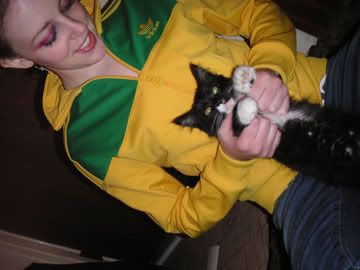Blood Meridian is a Western that is based on historical accounts taking place in the mid-1800s, primarily on the Texas/Mexico border. We readers follow The Kid, a hardened youth who joins a group of injun-killers. Remember when white man pillaged North America, killing and stealing to fulfill our manifest destiny? Some tribes of Native Americans fought back, so motley bands of scalp-hunters traversed the border killing for a value price. All the kid knows is violence, so he fits in well with this group.
It being a Western, you might predict we'll see the kid's personal growth: perhaps he starts out as a no-nonsense juvenile delinquent, tricked into joining Glanton's Gang because he likes the idea of becoming a hero. The Western Frontier will be crossed as he is taken under the wing of a wise veteran and emerges an intelligent Man set on making right all sorts of wrongs. McCarthy knows we were expect this out of a Western, so he takes those common archetypes (the naïve kid, the grizzled vet, violence as a rite-of-passage) and skews them. The kid doesn't cross the frontier and become a better man: instead, his growth is retarded. The cover of the novel tells us it's a "classic American novel of regeneration through violence" (Michael Herr). We expect regeneration: The Kid must, as characters in frontier myths do, perform some act of violence that enables him to literally and metaphorically cross the frontier. Do we get that regeneration?
Now that's I've blathered on for a while about Westerns and our focus character, the kid, I'll let you in on something: the kid is not the most interesting character in the book. The Judge (Holden) is an epic antagonist. Epic in the Iago sort-of-way: he's just so damn evil (murderer, likely pedophile) and intelligent (can speak a million languages, can perform any task, can dance like a motherfucker). Imagine an immense man—tall and fleshy—with absolutely no hair on his body and a predilection for walking around naked. Expriest Tobin tells the kid, "You wouldn't think to look at him that he could outdance the devil himself now would ye? God, the man is a dancer, you'll not take that away from him" (123). That's the judge. If you're considering reading the book, do it for the sake of Holden. Some say he's the devil incarnate...
I seen him before, said the kid. In Nacogdoches.
Tobin smiled. Every man in the company claims to have encountered that sooty-soled rascal in some other place (124).
Holden has a peculiar habit of taking notes on all signs of civilization and wildlife the party comes across. He takes rubbings of ancient stonework, shoots birds and stuffs them, and studies butterflies. When asked by Toadvine why (198), he replies, "Whatever in creation exists without my knowledge exists without my consent."
This is my claim, he said. And yet everywhere upon it are pockets of autonomous life. Autonomous. In order for it to be mine nothing must be permitted to occur upon it save by my dispensation...But that man who sets himself the task of singling out the thread of order from the tapestry will by the decision alone have taken charge of the world and it is only by such taking charge that he will effect a way to dictate the terms of his own fate (199).
So is Holden simply taking a hold of his own fate, by collecting all of this knowledge? No, it can't be, for that's not all he is capable of, as he handles a howitzer like a handgun and cites court cases better than any lawyer. He can, quite literally, do anything: he's the MacGyver of the West. Without the mullet.
When we're analyzing this book as a Western, it's easy to focus on the kid's journey, as he is the character we follow from the get-go. He, more or less, conforms to the archetype. I mentioned before that his growth is retarded. It's not that he remains static: it's that his development is subtle. As a teenager, after most of the company has been destroyed, he has a couple of chances to shoot the judge, who has been pursuing him and Tobin. But the kid doesn't do it. Is this the moment we realize he's crossed the border? The Blood Meridian?
The last dozen pages or so of the novel fast-forward to over a decade later when we find the kid, solitary as ever, going from town-to-town. Did he find what he's looking for? Is he even looking for anything? Waiting, perhaps. The Judge isn't done with him. I shan't spoil it for you, but leave you with this, from the final page (335):
Towering over them all is the judge and he is naked dancing, his small feet lively and quick, and now in doubletime and bowing to the ladies, huge and pale and hairless, like an enormous infant...He dances in light and in shadow and he is a great favorite. He never sleeps, the judge. He is dancing, dancing. He says that he will never die.
So what, exactly, is the judge? An insanely skilled man who's discovered the Fountain of Youth? The devil? A symbol of evil? Read the book already. There is much more to talk about (morality, expansion, redemption), so I'm cutting myself off. Yes, I didn't even answer all of the questions I asked (do we get that promised regeneration?). I recommend this book if you can handle slow plot development and violence. After thinking on it for a little over a day, I'm sold. My feelings have gone from "Huh" to "YES."
KK
Next up: Persepolis, which should be a quick read.
